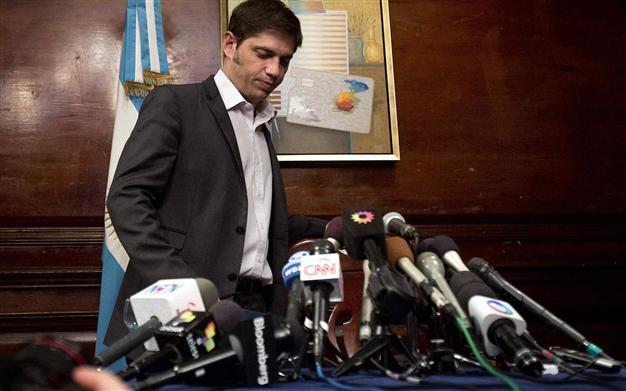Argentina defaults for second time in 13 years as 'vulture talks' fail
NEW YORK - Agence France-Presse

Argentina's Economy Minister Axel Kicillof arrives at a press conference at the Argentine Consulate in New York July 30. REUTERS Photo
Argentina was in default July 31 for the second time in 13 years after the failure of last ditch talks with U.S. hedge funds it has branded "vultures." After hours of meetings in New York, Economy Minister Axel Kicillof emerged to confirm that no deal had been reached.
This left it inevitable that Latin America's third largest economy was unable to meet repayment obligations by the midnight deadline. "Unfortunately, no agreement was reached and the Republic of Argentina will imminently be in default," said Daniel Pollack, the lawyer appointed by a U.S. court to oversee the talks.
Ratings agency Standard and Poor's had already placed Argentina in "selective default" when the talks ended. Argentine press reports suggested an alternative solution - in which a coalition of Argentine private banks buy some of the outstanding debt - was being prepared, but until that comes about the country is technically in default.
Kicillof complained that the creditors, U.S. hedge funds that bought defaulted Argentine debt at knockdown rates and then went to court to demand full payment, had refused to compromise. "They were trying to impose on us something illegal," he declared, confirming that he was heading back to Buenos Aires without a deal.
Kicillof slammed S&P's downgrade, arguing that Argentina could not be regarded as being in default since the money for the repayment was in a U.S. bank account ready to be paid but frozen by U.S. District Judge Thomas Griesa's court order.
"Argentina paid. It has money. It is going to continue to pay. The one who is responsible for this situation is Judge Griesa," he said. "We are going to pay those who hold bonds that have been defaulted on, but on reasonable terms, not on terms that amount to extortion, created under pressure, under a threat," he said.
Trapped in a Catch-22July 30 marked the deadline for Argentina to make a $539 million payment on debt it had restructured with cooperative "exchange creditors" after its previous 2001 default. Argentina had deposited the sum - for payment to those bond holders who had accepted a write-down in deals reached in 2005 and 2010 - in a bank account when it was due at the end of June.
But Griesa blocked the bank from forwarding the payment unless Argentina also paid two U.S. hedge funds - the "holdout creditors" - the full value of their bonds, $1.3 billion, at the same time.
Argentina and these funds - NML Capital and Aurelius Capital Management - have spent the last two days locked in talks in New York with a U.S. court-appointed mediator to try a set a deal.
"What we offered them in terms of profit was 300 percent. It was not accepted, because they want more, and they want it now," Kicillof said, insisting the funds were being unreasonably greedy. "Default is not a mere 'technical' condition, but rather a real and painful event that will hurt real people," Pollack warned, while not assigning blame for the failure of the talks.
There was no immediate reaction from the hedge funds. S&P's designation of "selective default" acknowledges that Argentina is current on payments to some creditors and is probably able to make some payments on the debt it has defaulted. It also said it could remove the default label once the country makes the payment on the restructured bonds. Griesa's ruling has trapped Argentina in a Catch-22.
Buenos Aires says paying the holdouts, which it calls "vulture funds," could expose it to claims for up to $100 billion from creditors who had previously agreed to take a 70-percent haircut.
The 92 percent of creditors who agreed to take a haircut could launch claims for equal treatment under what is called a Rights Upon Future Offers, or RUFO, clause.
The RUFO clause expires at the end of the year, leaving Argentina scrambling to find a way to placate the holdouts until then. Analysts have warned a default would deepen the economic malaise gripping Argentina, exacerbating its already troubling inflation - prices rose 15 percent in the first half of the year - and perhaps forcing another devaluation of the peso, already devalued 20 percent in January.
A default would also likely prolong Argentina's isolation from global capital markets, which it has been locked out of since halting payments on its more than $100 billion in foreign debt in 2001.
That default, the largest in history at the time, plunged Argentina into an economic and social crisis that it is still battling to overcome.
The global consequences of a new default would however be far smaller than in 2001, analysts say, as Argentina has since been isolated from world financial markets.
